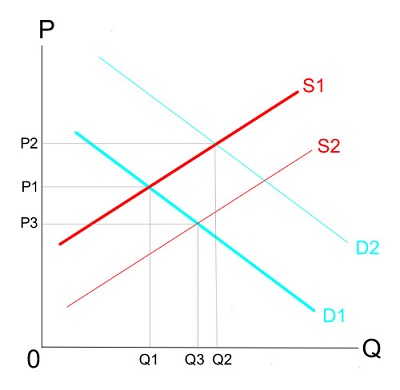
No shortage of sugar is expected despite the decrease in world supply caused by unusually cold weather in Brazil, the largest producing country. the Wall Street Journal reports (“Sugar Prices Soar After Brazil Cold Snap,” September 3, 2021):
There is no prospect of a sugar shortage, traders and analysts say. Rather, higher prices are likely to draw sugar out of India and into the world market.
Note however that the story ignores the impact of higher prices on lowering quantity demanded compared to what it would otherwise have been.
On a free market, an increase in demand (the whole schedule of quantities demanded and prices) or a decrease in supply (the whole schedule of quantities supplied and prices) brings a price increase, not a shortage. A shortage is the unavailability of a good at the going price on the legal market. When prices are capped by the government, a shortage is indeed what happens: quantity supplied is lower and quantity demanded higher than they would otherwise be.
A price increase is what prevents a shortage. If some national governments cap the price of sugar (or coffee, which is also currently subject to a supply reduction), then, of course, a local shortage will develop. I explained the simple economics of supply and demand as well as the phenomenon of shortages in two Econlog posts: “A Frequent Confusion and the Yo-Yo Economic Model” and “Don’t Confuse Shortage and Smurfage.”
The WSJ story or its sources missed another lesson from elementary economics when it states:
Adding to sugar’s upward momentum, hedge funds have piled into bets on higher prices. The number of bullish long positions held by money managers in raw-sugar futures outnumbered short positions by 268,094 contracts last week, Commodity Futures Trading Commission data show. That is up from just under 161,000 contracts in early April.
Hedge funds and other speculators can influence only short-run prices—in this instance, by buying now when prices are lower and selling later when they expect prices to be higher, thereby pushing down future prices in times of greater scarcity. As Jean-Baptiste Say observed two centuries ago, speculators move goods in time just like merchants move them in space. Speculators smooth price movements over time.
Simple supply-demand analysis goes a long way in explaining what happens on markets. It provides simple explanations of complex phenomena—although understanding why demand curves slope downwards and short-run supply curves upwards does require some economic theory.

READER COMMENTS
Christophe Biocca
Sep 3 2021 at 9:00am
Your link for the Yo-Yo economic model article is broken, it should be this instead.
Pierre Lemieux
Sep 3 2021 at 9:13am
Thanks, Christophe, for your keen eye (and participation in the blog). I had also caught it before I saw your comment. That’s what happens when one writes posts in the early morning!
Craig
Sep 3 2021 at 2:27pm
I also wonder the impact on fuel demand in Brazil from COVID. I believe they use sugar-based ethanol there. I wonder if both curves shifted back?
David Seltzer
Sep 3 2021 at 5:44pm
Pierre said “Hedge funds and other speculators can influence only short-run prices.” True enough, but let’s give the oft vilified speculator his due. Speculators provide liquidity in markets, price discovery…most important as a transmitter of information… and assume risks other market agents want to unwind. As there are two sides to a market, Bid/Ask, those speculators keep markets efficient. I managed a medium sized hedge fund. Without speculators, my job would have been far more difficult.
Pierre Lemieux
Sep 4 2021 at 10:45am
David: True. I was intentionally focussing on only one narrow benefit of speculation.
Daniel Kian Mc Kiernan
Sep 3 2021 at 9:10pm
Lately, I’ve been noting to friends that references to an approaching bacon shortage in California are mistaken; that what is to be expected is increased scarcity, with a resulting increase in price and a decrease in quantity sold. (Though some might jest that demand for bacon were perfectly inelastic.)
Pierre Lemieux
Sep 4 2021 at 10:46am
Daniel: Good example.
Comments are closed.